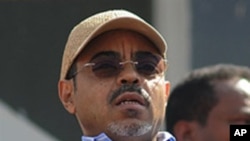Ethiopia's ruling party is holding a conference this week to discuss plans to rejuvenate the party and implement an optimistic five-year economic plan. Analysts say the reorganization will consolidate the power of Prime Minister Meles Zenawi.
Prime Minister Meles opened the eighth conference of the Ethiopian People's Revolutionary Democratic Front, or EPRDF, with a pledge to break the country's dependence on food aid within five years.
That contrasts with the most recent five year period, when a protracted drought left one out of every six Ethiopians in need of food assistance, and the United States shipped in more than half-a-billion dollars worth of commodities in a single year.
The conference, in the town of Adama, some 100 kilometers south of the capital, is expected partly to unveil the new five year growth plan, and partly to reaffirm Mr. Meles as the EPRDF leader, and therefore head of government in what he describes as a "dominant party state."
But the gathering also comes as the party is undergoing a major reorganization. Several senior figures, including Foreign Minister Seyoum Mesfin, have been dropped from powerful regional political bureaus. Mr. Meles has hinted that he will include a host of fresh faces in a cabinet reshuffle next month.
Little is known about the details of the shakeup. But Horn of Africa political analyst Medhane Tadesse says the removal of many of Mr. Meles's former comrades in the Tigrayan guerrilla movement and their replacement by younger party loyalists will reinforce the prime minister's already strong grip on power.
"The coming of what we call 'new guys' can only hasten this process rather than change or alter it because Meles is going to sell his ideas not to his old friends, but to new guys from different parts of the country without any history of struggle, any constituency by themselves. So it further consolidates his personal influence. So his ideas and his personality will continue to dominate Ethiopian politics," said Medhane.
Medhane calls the concentration of power a worrisome step toward one-man rule.
"The tragedy in recent Ethiopian politics is that the government, the ruling party and the state have become one. When you have a strong individual at the center of all this, then it's not simply an alignment of the state, the party and the government. The collective leadership has shrunk over the years and the prime minister has become central to everything happening - not only within the party, but also within the state and the government of the day," said Medhane.
Political scientist Solomon Mebrie of Addis Ababa University calls the EPRDF reorganization "a bold move." But he says he worries that the lack of a clear line between party and state will breed corruption.
"Blurring the distinction between the state and the EPRDF as a political organization has created a condition in which particular state functionaries and personnel at the local level use this as an instrument of personal aggrandizement. That has in an important way contributed to poor conditions of governance, where principles of accountability, rule of law have been seriously compromised," he said.
State-run news services reported that Mr. Meles welcomed to the conference visiting delegations from China's Communist Party and members of the Indian government as well as from affiliate organizations from Yemen, Sudan and Mozambique.
Analyst Medhane Tadesse says the invitation list reflects Ethiopia's shifting priorities from West to East.
"I think the ruling party in Ethiopia has come to realize that the West still has the money, but it has lost the leverage to influence things in internal politics in countries like Ethiopia. Ethiopia still needs Western support, development aid. But it also recognizes the value of new emerging powers like India and China. It's partly ideological, but it's also a matter of political expediency," said Medhane.
Even Mr. Meles's staunchest critics admit he is one of Africa's most formidable leaders - one who has helped raise Ethiopia's profile on the world stage. He has represented Africa at meetings of the so-called Group of 20 and at last year's Copenhagen climate summit. He will lead the African delegation at the Cancun climate meeting in December.
Mr. Meles is expected to travel to New York for next week's United Nations General Assembly annual debate. While there, he is scheduled to address the annual World Leaders Forum at New York City's Columbia University.
The invitation to speak at the forum sparked strong objections, mostly from the Ethiopian diaspora in the United States.
Analysts say Ethiopia PM Consolidates Power in Government Reorganization




